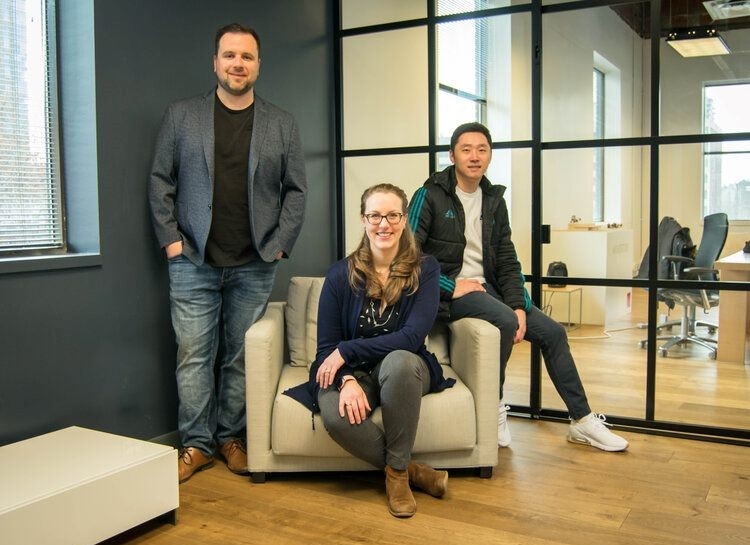Commerce grad Wesley Sessenwein hopes to invest in the ‘best talent Canada has to offer’
 PayShepherd’s co-founders, from left: Wesley Sessenwein, BComm 08, Jenn Hunter and Johan Lee | credit: PayShepherd
PayShepherd’s co-founders, from left: Wesley Sessenwein, BComm 08, Jenn Hunter and Johan Lee | credit: PayShepherd
Wesley Sessenwein, BComm 08, is having a big year.
In January, PayShepherd, the tech company he co-founded with Jennifer Hunter and Johan Lee in 2018, was ranked by Forbes as the 13th Best Startup Employer out of 1,500 Canadian companies, based on measures of employer reputation, employee satisfaction and growth. In March, PayShepherd’s latest round of funding yielded $7 million worth of fresh investment, an exciting proposition for a growing startup. And later this year, the Calgary-based business will open a Montreal office.
“This recent financing round gives us a war chest to place bets on the future as we see it,” Sessenwein says. “It’s any entrepreneur’s dream to have access to capital, and we’re going to be able to invest in hiring some of the best engineering and sales talent that Canada has to offer.”
‘I learned how to hustle’
Sessenwein credits Concordia with showing him early in his professional journey what structure and discipline look like. At the same time, he had to learn to solve problems creatively when working in addition to taking on a full course load. “I learned how to take the shortest path from A to B to get to the desired outcome. I learned how to hustle.”
He took that discipline and hustle to Sun Life after graduating, gaining a tremendous amount of sales experience in just a few years with the insurance company. Then he felt the need for change. At first, it seemed like more schooling was in order, so he returned to Concordia to work towards a graduate degree in business administration.
“I did about a semester before I realized that it wasn’t actually school I was looking for,” Sessenwein says. “It was to shake things up.”
For the born-and-raised Montrealer, shaking things up meant moving west to Alberta, where the energy sector was and still is booming, receiving major capital investments and offering plenty of work.
Sessenwein joined a small construction company serving some of the larger oil and gas brands. By the time he left, that business had grown its revenue and staff multiple times over, and he had a feeling that he could accomplish the same feat. “I got to see what it was like to be a shrewd entrepreneur: the wins, the losses, the excitement and stress,” he says. “And I wanted to put the chips down on myself.”
So Sessenwein founded a construction company of his own.
Naturally, being part of such growth was not exactly the same as leading it. Sessenwein got to experience what it was like to be in charge of dozens of employees and millions in revenue, not to mention the pain that came along with actually owning the balance sheet, dealing with mountains of manual paperwork and processes. That struggle directly informed his next venture, PayShepherd.
Eliminating friction in business relationships
As Sessenwein describes it, PayShepherd is a business software sold to industrial operators, including Fortune 1000 manufacturing, energy, pulp and paper, and mining companies, who spend hundreds of millions of dollars per year on outsourced service providers: cleaners, security guards, welders, IT consultants and so on.
“These contractor relationships are critical to the success of the facility and can be horribly complex and administrative to manage,” Sessenwein says.
He knows what it’s like to make a mistake in these circumstances, because he made them, too — he’s human, after all. “But those mistakes can be costly,” Sessenwein says. “An unintended administrative error that took a fraction of a second to make could destroy a decade of relationship building. That’s scary.”
PayShepherd is a vendor relationship management (VRM) platform that works to simplify the complexities and eliminate the friction in these relationships through digitization and automation, from preventing billing mistakes to offering immediate insight into unusual spending so no one gets caught off-guard.
“PayShepherd is the layer between the service provider and client that provides visibility, compliance and an incredibly rich data layer that helps maximize the business outcome,” he adds.
As the startup rides its current wave of success, Sessenwein points to his home province of Quebec as a major influence as well as a market with excellent potential, especially for someone with his background.
“Having grown up in Montreal and graduated from Concordia, I feel fortunate that I understand the cultural nuances of communicating in French and doing business in Quebec in a way that an outsider might not,” he says.
“We see tremendous opportunity in Quebec, which is why we’re excited to open a Montreal office and invest heavily in building bilingualism into our business.”

